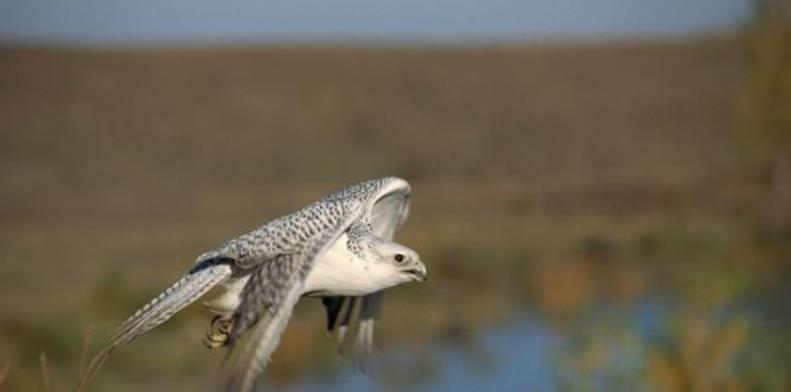"There are sixty out of three hundred feather worms, and Shen Jun is the most numerous Hai Dongqing." Sexual spirit gold spirit contains fire virtue, and the foreign material reflects the Yao light star.". The author of this poem is the Kangxi Emperor of the Qing Dynasty, and the content of this poem is in praise of a majestic and heroic Hai Dongqing. Hai Dongqing, a famous bird of prey living in the north, after domestication, it can become a good hunting assistant for humans with its lightning speed and fierce hunting skills. The ancient Chinese realized this very early, and the history of domesticating Haidongqing is extremely long.

Haidongqing, scientific name spear falcon, is a larger bird of prey among the falcons. Adult Haidongqing is about 50 to 60 cm long, weighs about 1.5 kg to 2 kg, and has a wingspan of about 1 m to 1.5 m. Haidongqing has a flight speed rarely seen in birds, with a high-altitude flat flight speed of more than 140 kilometers per hour, a dive speed of even more than 200 kilometers per hour, and a flight altitude of more than 5,000 meters. The vast majority of birds and some small mammals are included in its attack range.
Haidong Qing is adapted to the cold climate and is afraid of extreme heat, and China's three northeastern provinces are one of their most important habitats. The ancient ancestors of the Northeast mastered the mature technique of domesticating Hai Dongqing very early on and offered it as a tribute to the emperor. Hai Dongqing's majestic posture and superb hunting soon made it the favorite pet of the emperors and generals.
As early as the Tang Dynasty, the emperors set up a special "five squares", including carving fang, hawk fang, harrier fang, eagle fang and dog fang, of which the hawk fang specialized in domesticating Hai Dongqing. The emperor of the Liao State was born from a nomadic fishing and hunting tribe, and he liked to hunt by nature, and Hai Dongqing was even more popular, releasing Hai Dongqing to catch high-flying geese, swans, etc. was the most enthusiastic pastime of the Emperors of the Liao Kingdom. Emperor Yelü Yanxi of the Liao Dynasty even more loved Hai Dongqing to the point of obsession.
Hai Dongqing has also played an important role in the course of history. In the last year of the Liao Dynasty, in order to meet the demand for Haidongqing's preferences, the emperor forcibly levied a large amount of Haidongqing from the Jurchens. The Jurchens almost all the Haidongqing in the territory were extinct, and they still could not meet the needs of the Liao people. The angry Jurchens, led by a generation of tyrants, rose up, fought against the Liao state by force, and eventually led to the collapse of the Liao state.
The emperor of the Qing Dynasty started in the northeast of Guanwai and was very familiar with Haidongqing and had an innate hobby. Every autumn, the Emperor of the Qing Dynasty would personally visit the Mulan Paddock and carry out a large-scale hunting activity, which was commonplace and rarely interrupted. In this context, the Qing Emperor's demand for HaiDongqing is naturally very urgent, Haidongqing's value is rising, an ordinary Haidongqing is worth 30 taels of silver, good quality, pure white hair "jade claw", is worth thousands of gold, the Qing Emperor in order to get them can be described as a thousand gold.
However, it is confusing that the Ming emperor was not interested in Hai Dongqing at all. As early as the early and middle ming dynasties, the Jurchens in Liaodong were still primitive tribes of slash-and-burn cultivation, and every year they would send emissaries to pay tribute to the Ming Dynasty for some precious local specialties to show their submission. As an iconic animal of Liaodong, Haidongqing naturally appears in the tribute list.
In the first year of Chenghua, during the reign of Emperor Mingxianzong, the Jurchen tribes all inspected Anu to come to the capital to meet the emperor, and brought a large number of valuable specialties with him, including two Haidongqing, which was categorically rejected by Emperor Mingxianzong. Not only that, in the fifth year of Chenghua, Emperor Mingxianzong issued an edict, the Ministry of Rites, which clearly stipulated that "do not pay tribute to flowers, trees, birds and beasts", "Except for horses and mink skins, Haidongqing and rabbits are not allowed to come in the future", and then form a customization.
Why didn't the Ming Emperor like Hai Dongqing, even bai to give it? Because the Emperor of the Ming Dynasty believed that "setting up eagles and running dogs" to go out hunting was an act of indulgence in pleasure without doing business, "such wild birds can make people indulge in field hunting", fearing that they would indulge in these pet playthings and delay state affairs, so they refused. Today, Haidongqing has become a rare animal protected by the state, and it is the duty of every countryman to love this spirit of nature.
References: "Review of the Study of the Tribute System of the Jurchen Dynasty in the Ming Dynasty", "The Great View of the Wild History of the Qing Dynasty", "Liubian Jiluo", "Records of the Ming Xianzong"